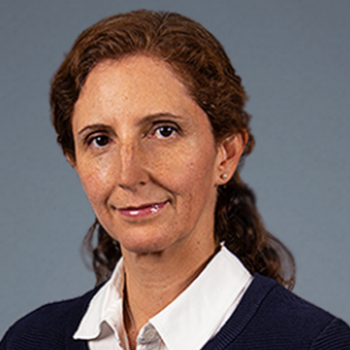Cristina Aguayo-Mazzucato, PhD, MD
-
Researcher
-
Islet Cell and Regenerative Biology
Assistant Investigator
Assistant Professor, Harvard Medical School
Dr. Aguayo-Mazzucato was born in Barcelona, Spain. She received her MD degree in General Medicine from the National Autonomous University in Mexico (UNAM) in 2000, and a PhD degree in Biomedical Sciences from UNAM in 2007. Dr. Aguayo-Mazzucato performed her graduate work studying the postnatal development of pancreatic beta cells. In 2007 she joined the laboratory of Prof. Susan Bonner-Weir at Joslin Diabetes Center as a postdoctoral fellow studying beta-cell functional development. She then studied how immature beta cells models develop functional maturity and developed in vitro maturation strategies that are currently used in protocols that develop cellular replacement therapies for diabetes.
Her laboratory studies the aging process of pancreatic beta cells and how this contributes to the development of diabetes. So far, this work has identified beta-cell specific aging markers that allow us to discern and track the dynamics of the age of individual cells and have identified cellular senescence as a key mechanism by which beta cells age. Additionally, it has shown that different models of insulin resistance accelerate the aging process of beta cells and that targeting this aged population improves insulin secretion, cellular identity and blood glucose levels. Going forward, they will continue the study of the mechanisms behind beta cell senescence, a process that they hope will identify new therapeutic targets. Additionally, she is interested in identifying pharmacological and non-pharmacological interventions that can halt the course of diabetes. The laboratory’s overarching goal is to translate these findings into the clinic and create new and novel interventions that can alter the course of Type 2 Diabetes. They are confident many of these findings will also be relevant to Type 1 Diabetes.
Dr. Aguayo-Mazzucato was promoted to Research Associate in 2013 and Assistant Investigator in 2018 in the Section of Islet Cell and Regenerative Biology. She has been a recipient of the Sheehan Family Research Fellowship, the Iacocca Fellowship and several Excellence in Tutoring Awards from Harvard Medical School. She is currently on the editorial board for Diabetes/Metabolism Research and Reviews (DMRR) and Pilot and Feasibility grants awarded by the Boston Area Diabetes Endocrinology Research Center and by Joslin Diabetes Center have funded part of her work.
We are interested in studying the aging process of pancreatic beta cells and how this contributes to the development of diabetes. Additionally, we are interested in identifying pharmacological and non-pharmacological senolytic interventions that can halt this process in an attempt to alter the course of type 2 diabetes. So far, we have identified beta-cell specific aging markers that allow us to discern and track the dynamics of the age of individual cells and have identified cellular senescence as a key mechanism by which beta cells age. Additionally, we have shown that different models of insulin resistance accelerate the aging process of beta cells, and that targeting this aged population improves insulin secretion, cellular identity and blood glucose levels. Going forward, we will continue the study of the mechanisms behind beta cell senescence a process that will identify new therapeutic targets. Ultimately, our overarching goal is to translate these findings into the clinic and create new and novel interventions that can alter the course of Type 2 Diabetes. We are confident many of our findings will also be relevant to Type 1 Diabetes.
Medical School: National Autonomous University of Mexico
RESEARCH INVESTIGATIONS
- Aguayo-Mazzucato C, van Haaren M, Mruk M, Lee TB, Crawford C, Hollister-Lock J, Sullivan BA, Johnson JW, Ebrahimi A, Dreyfuss JM, Van Deursen J, Weir GC, Bonner-Weir S. Beta-cell aging markers have heterogeneous distribution and are induced by insulin resistance. Cell Metabolism. 2017 25:898-910.
- Aguayo-Mazzucato C, Lee TB Jr, Matzko M, DiIenno A, Rezanejad H, Ramadoss P, Scanlan T, Zavacki AM, Larsen PR, Hollenberg A, Colton C, Sharma A, Bonner-Weir S. T3 induces both markers of maturation and aging in pancreatic β-cells. Diabetes. 2018 67:1322-1331.
- Aguayo-Mazzucato C*, Andle J, Lee TB, Midha A, Talemal L, Chipashvili V, Hollister-Lock J, Van Deursen J, Weir GC, Bonner-Weir S. Acceleration of beta-cell aging determines diabetes and senolysis improves disease outcomes. Cell Metabolism. 2019 30:129-142. (*corresponding author)
REVIEWS
- Aguayo-Mazzucato C. Functional changes in beta-cells during ageing and senescence. Diabetologia 2020. In press
- Aguayo-Mazzucato C*, Midha A. Beta cell senescence in type 2 diabetes. Aging (Albany NY) 2019 11:9967-9968. (*corresponding author)
- Aguayo-Mazzucato C*, Diaque P, Hernandez S, Rosas S, Kostic A, Caballero AE. Understanding the growing epidemic of type 2 diabetes in the hispanic population living in the United States. Diabetes Metab Res Rev 2018 : e3097. ( *corresponding author)
- Aguayo-Mazzucato C, Bonner-Weir S. Pancreatic beta-cell regeneration as a possible therapy for diabetes. Cell Metabolism 2018 27:57-67.

